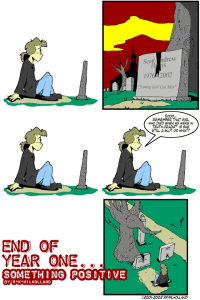Monthly Archives: January 2015
 Zoroastrians feed their exalted dead to vultures.
Zoroastrians feed their exalted dead to vultures.
Overeating is contagious! Quick, let’s to tell the fatties that they have to stop overeating for the public good.
How employers are attempting to influence their employees’ vote.
Wind turbines negatively affect housing prices. Seems to me that means we should put them in the costlier locations, perhaps applying some housing price equilibrium. Right?
Renting outfits like Rent-a-Center are helping people pay three times cost so that they can have nice things. The thing that sucks about markets is people.
Generous loan terms are being used to entice customers to buy more expensive cars. The thing that sucks about markets is people.
Bloomberg News thinks that China’s megacities just aren’t big enough.
Ever wondered about the Mormons’ “magic underwear“? Well, they explain it in a new video.
I’m not sure that these 1920 Soviet oil paintings featuring mechs are actually authentic.
These diagrams of co-sleeping positions and these captions on these stock photos are hilarious.
The Economist writes about the rise of the web comic:
In 2012 he is finally getting his way. As the newspaper industry continues its decline, the funnies pages have decoupled from print. Instead of working for huge syndicates, or for censored newspapers with touchy editors, cartoonists are now free to create whatever they want. Whether it is cutting satire about Chinese politics, or a simple joke about being a dog, everything can win an audience on the internet.
This burst of new life comes as cartoons seemed to be in terminal decline. Punch, once a fierce political satire magazine whose cartoons feature in almost every British history textbook, finally closed its doors in 2002. The edgier Viz magazine, which sold a million copies an issue in the early 1990s, now sells 65,000. In the United States, of the sprawling EC Comics stable, only Mad magazine remains, its circulation down from 2.1m in 1974 to 180,000. Meanwhile, the American newspaper industry, home of the cartoon strip, now makes less in advertising revenue than at any time since the 1950s.
 It tracks the rise and fall of the newspaper strip, to the rise of the web comic. It has all the trappings of an unconvincing web-bang-bam piece, but is actually a quite good article and makes a good case that the web truly does provide a better outlet for cartoonists rather than just acting as a farm system (as blogging often does).
It tracks the rise and fall of the newspaper strip, to the rise of the web comic. It has all the trappings of an unconvincing web-bang-bam piece, but is actually a quite good article and makes a good case that the web truly does provide a better outlet for cartoonists rather than just acting as a farm system (as blogging often does).
I don’t read any comics, web or otherwise, on a daily basis. The only one I’ve read thoroughly is Something Positive, and at times Real Life. which I will get to in a minute. I’ve heard a lot of good things about MegaTokyo, though it is (like the article says) hard to get into if you didn’t start… a long time ago. XKCD is iconic, of course, but I mostly go there only when someone links to it. It seems that most webcomics are either one-offs like XKCD, in which case I have a hard time getting really into them, or they’re involved like MegaTokyo or Something Positive, which require a lot of investment.
It’s kind of difficult to read the latter on a computer. They sell merchandise, but what I really want is an ebook or ecomic so that I can devote some time and sit down and read it conveniently. Even though they’re free online, I would actually pay – and possibly pay well – for the convenience of being able to read them on a Kindle or tablet. Because I’m bad about reading comics daily, I tend to read Something Positive in spurts. Years at a time. Often, actually, starting from the very beginning and getting up to the new stuff that I haven’t read. I’ve read about 10 years worth of SP, and have about three years left to read, but I’d easily pay $10/yr, or maybe even $20, for every year he’s got.
It’s not entirely unlike how some CD prices have fallen to the price of MP3s, but I’d spend a couple extra dollars on MP3s just to save myself the trouble of ripping the CDs.
“I do not agree with what you have to say, but in the event of your death for saying it, I will expend most of my energy reiterating my disagreement with you in the strongest possible terms. Racist.” -Voltaire, if alive today.
 A Morton Salt building wall collapsed, and the Acura dealership next door got the damage.
A Morton Salt building wall collapsed, and the Acura dealership next door got the damage.
Here’s a downside to tiny houses that you don’t necessarily think about: They can be stolen.
The importance of the college football kicker.
Massachusetts’s Registry of Motor Vehicles is allegedly doing the bidding of insurance companies.
Sweet! All hope is not lost! Scientists have discovered the first new anti-biotic in 30 years.
I know it’s wrong (racist, sexist, a mark of privilege, etc.) to tell people how they should or shouldn’t protest, but… seriously.
Related to a recent discussion on buying vs renting, the Wall Street Journal had a pretty good rundown. Trulia has a calculator.
France’s 75% tax has bitten the dust.
Bosnia and Herzegovina has an insanely complicated system of government. Indicative, perhaps, of a nation that should not be a nation. Or, at least, a degree of (con)federalism that makes them almost independent of one another. Of course, for some, the only fair thing to do is let the Bosnians (or Bosnians and Croats) tell the Serbs what to do because majority.
Full-blown LibreOffice may be coming to Android, if they can just slip the app by 4mb.
The Dish Network is giving cord-cutters live sports, as well as other channels.
Jacob Canfield argues that there is nothing wrong with criticizing Charlie Hebdo for running the pieces that precipitated the bombing (and for being “racist assholes.” I don’t know about wrong, but after what happened, I consider it beside the point. And of course you have the right to criticize them (we won’t bomb your house), but Canfield’s free speech doesn’t mean freedom from criticism, either.
Razib Khan explains that taboos against blasphemy aren’t crazy. They’re normal.
Good news, says Russell Saunders, your kids can get screen time!
West Virginia Senator Joe Manchin is considering running for his old job as governor:
“Senator Manchin loved being governor of West Virginia and has made no secret of his frustration with the partisan gridlock and dysfunction of Washington,” Manchin spokesman Jonathan Kott told the Gazette last April. “Senator Manchin is leaving all his options open for 2016 and will continue to look for the best way to bring common sense to Washington.”
The following month, in May 2014, Manchin told the AP he was keeping “all options open.”
I have two minds on the subject.
A part of me doesn’t understand why politicians would ever trade a governorship for the senate. Politicians are, by their nature, ambitious. If you’re a governor, you’re the Big Fish. You are the chief executive of one of the fifty states of the most powerful nation on Earth. Why would you give that up to be a freshman senator, where you have but one of a hundred votes. The best reasons I can think of are:
- You come from a small and comparatively inconsequential state. Like, say, West Virginia. You may be the most important person next to the president for the West Virginia Gazette, but you’re rarely going to get on Meet the Press as a governor. Of course, a lot of senators never get on Meet The Press either, but your odds are better.
- You can, ultimately, be more powerful as a senator than you can as a governor. It’s unlikely that you will, but you can. It’s a bit of a moving target as the larger the state you are from, the more difficult it is to get more power as a senator. But there’s not much doubt that Tom Daschle (D-SD) or Harry Reid (D-NV) became as senators what they never would have become as governors. The same is likely true of any recent Senate Majority Leader, as they have come from smaller states (the largest being Tennessee). That may be a product of the senate’s small state advantage, or may be the product of ambitious people from small states focusing on the senate instead of state politics, or both.
- Being in the senate can be easier. Say you are not all that ambitious (for a politician). You want to have influence, and you want to make your mark, but you don’t want to actually be responsible for much. The Senate is the perfect place for you! Now, senators can throw themselves into the job, like John McCain, but you don’t really have to. You go to some meetings, you make some speeches, and you vote on bills. The pension is nice. You might get some stuff named after you (even if you are an unremarkable senator). When you leave, you can make a lot of money as a lobbyist. Which brings me to…
- Income potential. You make a lot of connections in Washington that you wouldn’t make in your state’s capital. You get to know people and other people will want to pay you lots and lots of money to introduce them to the people you used to know.
- You want out of your stupid backwood state and want to live in DC. This is presumably more of a draw if you’re from South Dakota than California, but some people – and politicians in particular – like to live in important places. Washington DC is one of the most important places on earth.
- Term limits, where applicable.
- You’re from a small state but you want to be president. This one is actually pretty dubious. If you’re from a small state, it’s exceedingly unlikely that you come from a small state. The only two presidents in recent history to come from small states are a charismatic governor and a very important general. A couple small or middling state senators have gotten party nominations, but they lost. If you want to be president, it’s historically been better to be a governor. Though between Obama and Hillary Rodham Clinton, maybe that’s changing.
Personally, I find reason three to be the most compelling. Other than term limits, of course. But that’s the mentality for why I would make a crappy politician.
With applications and enrollment in law schools plummeting, law schools are having to lower their admissions standards:
Low scores on the Law School Admission Test have dipped at most schools in recent years, a new report shows. A paper released last month by the National Conference of Bar Examiners, the nonprofit that creates part of the bar exam, shows that since 2010, 95 percent of the 196 U.S. law schools at least partially accredited by the American Bar Association for which the NCBE had data lowered their standards for students near the bottom of the pack. The NCBE compiled data from the American Bar Association and the Law School Admission Council, the group that administers the LSAT, to illustrate the decline in LSAT scores for students at the 25th percentile—meaning, the students who were at the very top of the bottom quartile of students.
Standards aren’t just falling at lower-tier schools—Emory University, ranked among the top 20 U.S. law schools by U.S. News and World Report, had the single largest drop in LSAT scores for this group, enrolling bottom-tier students who’d scored nine points worse than three years earlier—a 5 percent drop. In fact, 20 of the 22 U.S. News top-20 schools—there was a three-way tie for 20th place—were enrolling students with lower test scores. Across all schools, LSAT scores for the 25th percentile dropped an average of three points.
It’s not news that tough times have fallen on law schools and law degrees. Jobs in law are getting harder and harder to find, and the best and brightest are adapting to the new reality. But what having gone to law school has retained, thus far, is that the people who graduate from it are generally considered to be smart. If admissions criteria lower, will that change?
There have always been some questionable law schools out there. Not just some of the tent-pole schools that have only recently cropped up, but public schools as well (particularly HBCUs). Graduating from high school used to mean something, but at some point it became regarded by many as more a certificate of attendance than anything. College degrees, at least within some disciplines within some schools (particularly, but not exclusively, for-profit business park colleges) has similarly been devalued. A law degree from Harvard will always mean something, but will “a law degree” on its own fail to impress without knowing more (like “which school?”). Could be.
Law schools generally have something that other schools don’t, however: the bar exam. Unless they significantly dumb that down, the result of lower admission standards in law schools won’t be dumber lawyers, but law school graduates who can’t pass the bar. That is an extremely valuable tool. Schools that lower their standards too much should have an immediately apparent and transparent metric by which that will be made clear. Law schools can game and have gamed employment numbers. It seems harder for me to game bar passage rates. And since the tests are administered by states rather than by schools, it seems less likely that they will be lowered to make law schools look better.
Not that any of this will do a whole lot of good for New Yorkers who got law degrees from Arizona State and can’t put them to use, of course.e
 I would never pay $3,000,000 for a house (much less a condo), nor do I have much desire to live in Kansas. But if these two things were indeed the case, I would be all over this. And not because I’m worried about a nuclear attack.
I would never pay $3,000,000 for a house (much less a condo), nor do I have much desire to live in Kansas. But if these two things were indeed the case, I would be all over this. And not because I’m worried about a nuclear attack.
Kelsey Campbell-Dollaghan looks at the sad fates of the world’s tallest unfinished buildings.
Ann Friedman explains what it’s like to be a 6’2″ woman. I have to confess to being a little bit glad that Lain doesn’t appear to have really picked up our height genes (yet).
Google is throwing in the towel on its renewable energy research.
Hmmm. Increasing professional responsibility increases symptoms of depression in woman, decreases them in men.
Good news! The extra saturated fat you’re eating doesn’t end up in your bloodstream!
Kevin Drum looks at why the Democrats are having trouble with white working class voters, and why PPACA is such a tough sell.
I have long considered one of the advantages to self-driving cars that we would not need to own them.
Thanks to Creative Commons licensing, approaching one billion works are free to use online.
The title says it all: “Get Me Off Your Fucking Mailing List” is an actual science paper accepted by a journal.
Ecigarette use may lead to infection.
Angie Schmitt says that if you love nature, you have an obligation not to live near it.
India has a lot of universities, so another one opening isn’t a big deal. Except that it’s re-opening the world’s oldest.
I disagree with a couple items on this list of comic book heroes who should never have their own franchise. Booster Gold could be kinda cool. While the Hawkman they cite wouldn’t work out so well, Katar Hol could be pretty awesome.
There are simultaneous happiness and suicide epidemics in Utah, and Perry Renshaw thinks he has figured out why.
Via Vikram Bath, Mat Honan says not to buy another smartphone and instead buy an LTE tablet. Well, that’s not quite right. He says that increasingly, we are already buying tablets:
[W]hat we really use these devices for, according to network operations powerhouse Ericsson, is to move data—increasingly over the 4G wireless tech called LTE. You might think LTE just means a faster Instagram feed. It does. But LTE is also the main reason our smartphones are getting so large. Power-hungry LTE devices want bigger batteries. Bigger batteries mean bigger phones. It’s no coincidence that Apple, Samsung, LG, and Google have all rolled out 6-inch phonelike flagships since the end of 2013.
I say phonelike because, come on, these are tablets. They barely fit into a front pocket. They won’t fit into a back pocket—or at least not most back pockets. The average Levi’s have a back-stash that’s just 5.25 inches deep.
So is that a tablet in your pocket? Yes. LTE didn’t just change our phones into things that look like tablets; it also changed them into things that act like tablets. Older cell networks, even 3G, used dedicated connections to move your voice, just like a landline. But LTE turns your voice into data packets like the rest of Internet traffic. Until last year, carriers were mostly using older networks and technologies to carry voice calls, but now everything’s moving to voice over LTE, or VoLTE. It’s basically VoIP—like Skype.
I got a tablet for Christmas, which has a screen size of 8.4″. It stands next to my Note 4, which has a screen size of 5.7″… the latter still feels like a phone, and the former like a tablet (ditto my wife’s 7″ tablet, which at this point is a glorified Kindle). I don’t know where the line is, but there is one.
On the other hand, my hand is big and so I still have touch capability over most of my Note. For someone that has to use their Note the same way I use my tablet (with two hands), perhaps it is more tabletesque.
One thing that I find kind of annoying is that even though my Note has the size closer to that of a tablet than that of my first smartphone, the apps make a strict tablet/phone distinction. So the text on my email app is unavoidably large, meanwhile on the same app on the tablet is really small. The developers figure, I guess, that they are safe to put more stuff on a tablet than a phone. Which makes sense, except that I keep my tablet farther from my face. But I can’t because the text on some apps is too small. Then some apps that are perfect on the tablet would look much better in tablet mode on the Note, but it doesn’t quite work that way.
First world problems defined, I suppose.
Below is a video of Captain America in live movies throughout the years. It’s an interesting stand-in for the evolution of comic book movies more generally. I saw the ’94 movie when it came out. It’s almost the perfect encapsulation of the pre-Marvel movie revolution. Very by-the-numbers, not an ounce of inspiration.
I actually have a VHS movie from Turkey with “Captain America” in it, called 3 Adam Dev. Captain America teams up with a luchadore Mexican icon to take on a particularly evil Spiderman. Pieces of it here:
Here’s a mashup of 70’s Marvel heroes in a (non-existent) Avengers movie:
Lastly, if you have a couple hours to kill, here’s a full fan film for Spiderman. I haven’t watched it all the way through, but for what it is, the video quality is not terrible. (I usually have difficulty with amateur movies in large part because of worse film quality than this.) If it weren’t so long, I’d probably give it a shot and I’d still watch this before Id watch the FF movie below).
And if you have about 90 minutes to kill and do not value your time even slightly, here is a never-to-be-released Fantastic Four movie from 1994 created for no other reason than to retain copyrights:
 Masdar City is Abu Dhabi’s own (green!) ghost town!
Masdar City is Abu Dhabi’s own (green!) ghost town!
American houses keep growing and growing…
If I had three million dollars to spare and a desire to live in Kansas, I would love to get one of these condos housed in a missile silo.
Virginia Postrel wants to know who killed Wikipedia? Oddly, Wikipedia has not been updated to reflect the fact that it has died, which proves Postrel correct. (Actually, it’s an interesting story about open and insular cultures.)
Libby Nelson agrees with Peter Thiel that the Ivy League could be quite a bit bigger.
The methodology is kind of suspect, but it’s interesting to ponder the ramifications: Study shows whites think blacks are superhuman, magical.
When you look at admissions percentages, you’ll notice some interesting things. Some colleges that one might not consider particularly competitive nonetheless reject a lot of students. This isn’t that, but it came to mind when reading Amanda Graves’s complaint about being courted by colleges that have no intention of accepting them.
This story – about a game teaching pirates about the consequences of piracy – isn’t new, but still cracks me up.
Gabriel Rossman writes about the various hassles the right and left and willing and unwilling to endure.
Bryan Sheffield didn’t make it as a trader, and decided instead to make millions as an oil tycoon.
Fernando Hurtado argues that sometimes words are weapons, and should be treated accordingly.
Niamh McIntyre proudly explains how she prevented a debate on abortion at her university (Oxford).
Anne Applebaum argues that human rights – such as freedom of expression, doesn’t belong to the anonymous.
The good news is that oil prices are down. The bad news is what happens when oil prices go down. This is why I am maybe-possibly starting to come around on CAFE standards.
Robin Hanson looks at liberal and conservative jobs. He echoes points that I have made in the past about how the degree of meritocracy reliability in one’s career can reinforce conservative viewpoints.
Lyman Stone says that, contrary to what you may have heard about urban and rural revivals, they don’t seem to be happening.
